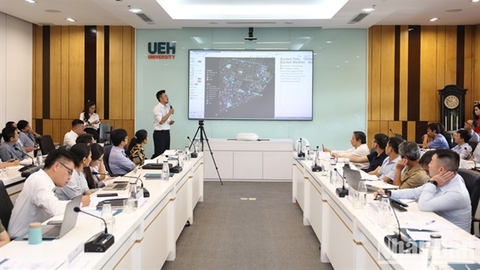
Speakers at a meeting discuss ways for HCM City to develop a carbon credit market to cut greenhouse gas emissions and respond to global warming. — VNA/VNS Photo
HCM City needs to adopt policies and channel financial resources to develop a carbon credit market in an effort to cut greenhouse gas emissions and respond to global warming, experts said.
Speaking at a seminar on Thursday, Dr. Sử Đình Thành, director of the University of Economics HCM City, the event’s organiser, said it was vital for the city to establish a carbon credit market to shape standards and trends for other localities to promote the carbon market.
“The establishment of a carbon credit market will create green financial resources for technological innovation enterprises in the city,” Thành said.
The city is preparing for a pilot phase of carbon trading, which is set to begin in 2025, with full operations expected to commence in 2028.
The carbon market is expected to attract investment in renewable energy, environmental technology, and international climate finance.
It will also promote a green economy and create new job opportunities while enhancing the city’s international reputation in climate change mitigation efforts.
Within Southeast Asia, only Indonesia has implemented a mandatory carbon market for the energy sector.
Recommendations
As a dynamic and fast-growing city, HCM City is facing various environmental challenges, particularly air pollution, with annual carbon emissions exceeding 60 million tonnes, accounting for over 20 per cent of the nation's emissions.
Dr. Nguyễn Thị Tuyết Nhung, a research group member on the carbon market at the University of Economics HCM City, said the city needed to exploit specific mechanisms and policies through the National Assembly to reduce greenhouse gas emissions and respond to climate change.
Resolution 98 allows the city to pilot a financial mechanism for measures to reduce greenhouse gas emissions via the use of the city’s budget for carbon credit exchange, according to Nhung.
These mechanisms enable the city to control environmental pollution, attract sustainable investments, generate revenue and funding for environmental projects, and fulfil international commitments on emission reduction.
Moreover, voluntary development of the carbon market will help the city generate significant revenue through issuing and selling carbon credits and from emission reduction projects using abundant energy sources such as solar, wind, and waste.
Hoàng Lê Nam Hải, another research group member on the carbon market at the University of Economics HCM City, said the carbon market would create opportunities to attract investment in renewable energy, environmental technology, and international climate finance.
It would also promote a green economy and create new jobs while enhancing the city’s international reputation in climate change mitigation efforts.
HCM City has set a target of reducing emissions by 10 per cent by 2030 and moving towards a low-carbon economy, with the possibility of a 30 per cent reduction.
Experts also recommended the city equip businesses and the community with knowledge while enhancing awareness of the carbon market.
It also needs to implement policies to encourage and support businesses in voluntarily setting emission reduction targets, and engaging in carbon credit transactions to offset their emissions.
Việt Nam plans to officially run a carbon trade exchange in 2028 under a project conducted by the Ministry of Natural Resources and Environment.
Under the scheme, Việt Nam will pilot the operation of this carbon credit market in 2025 to connect and exchange carbon credits with regional and international markets.
From now until the end of 2027, the country will focus on developing regulations on carbon credit management and the exchange of greenhouse gas emission quotas and carbon credits.
The operation of the carbon trade exchange contributes to reducing greenhouse gas emissions under previous climate commitments, especially the goal of Việt Nam to reduce net emissions to zero by 2050 under the COP26.
A carbon credit is a kind of permit that represents one tonne of carbon dioxide removed from the atmosphere.
They can be purchased by an individual or, more commonly, a company to make up for carbon dioxide emissions that come from industrial production, delivery vehicles or travel. — VNS